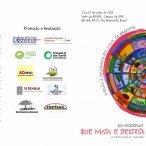
31 de julio de 2014 | Entrevistas | Financiarización de la naturaleza | Anti-neoliberalismo | Bosques y biodiversidad
Financialization of Nature: Brazil After the Reform of the Forest Code
Descargar: MP3 (1.4 MB)
“The battle over the Brazilian Forest Code is not over. It is an environmental and agrarian struggle. It is a struggle for land grabbed by business, lands conquered by the communities and for which they will now fight”, said Luiz Zarref, leader of the Rural Landless Workers’ Movement of Brazil (MST).
The Forest Code was approved in Brazil, despite strong resistance by La Via Campesina, environmental group Friends of the Earth Brazil and social movements and organizations who signed the Belem declaration.
The strong links of the Brazilian Congress with agribusiness corporations and the legal reform gave impunity to those responsible for deforestation, besides reinforcing commodification and financialization of nature, said Zarref. In this way, lawmakers implemented the green economy proposed at the 2012 United Nations Conference on Sustainable Development held in Rio de Janeiro, dubbed Rio+20. The “environmental reserve credits” of Brazil can now be traded at the Rio de Janeiro stock exchange.
Lucia Ortiz, coordinator of the Economic Justice Program of Friends of the Earth International interviewed Zarref while they were both participating in an event called “Tribute to the resistance of the peoples of the Amazonia”, held in Rio Branco, in Acre state, Brazil. The event organizers included the World Rainforest Movement (WRM), the Indigenist Missionary Council and Friends of the Earth Brazil.
Zarref explained that the reform of the Brazilian Forest Code exacerbated agribusiness in the country. “Unproductive large estates are now paradoxically considered productive lands because they generate environmental reserves and carbon capture credits”.
The MST leader also warned about the role of large conservationist NGOs in rural Brazil.
Nature Conservancy, in particular, offered online platforms to obtain data on the “environmental assets and liabilities” in the states of Para and Mato Groso, with the permission of the Ministry of Environment and with World Bank funding. This NGO “took advantage of the weaknesses of the Brazilian state and it knows exactly which are the large environmental assets and liabilities in the country”, he said.
Photo: Friends of the Earth Brazil
Imagen: Amigos de la Tierra Brasil








